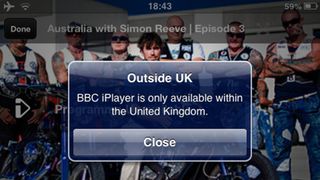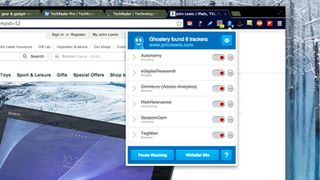How to 'hack' the internet and make it global again
Putting the world wide back in World Wide Web
Can I watch territory restricted services while abroad?
"Given that the internet makes geography somewhat irrelevant, it is annoying that companies try to impose arbitrary restrictions on who can watch or listen to content based on where people live," says BestVPN.com's Douglas Crawford.
"Restrictive licencing deals do not really make much sense in the modern connected world, except as a way for companies to artificially increase their profits to the detriment of consumers."
Crawford says that the US version of Netflix has around three times as many movies available as the UK version does, while only UK residents can watch BBC iPlayer.
"Fortunately there are a number of ways to 'spoof' geographic location, the two most popular being VPN and changing DNS settings," says Crawford.

Digital Strategist Matthew Barby, from Wyatt International, uses a remote desktop protocol (RDP) to log in to his Virtual Private Server (VPS) from abroad, allowing him to access his files. A side-effect of this is access to geo-fenced services like the BBC iPlayer.
"I see no issue at all with this approach," he says. "If I want to watch something online, there's a ton of ways that this could be done, most of which are made up of fairly questionable websites. By using my own server I can ensure that I'm not picking up any malware and receiving a ton of ads focused around the streaming site that I've accessed."
But is it OK for people to use VPNs to watch BBC iPlayer abroad, or perhaps access Netflix US or Netflix Canada from the UK (or vice versa)?
Get daily insight, inspiration and deals in your inbox
Get the hottest deals available in your inbox plus news, reviews, opinion, analysis and more from the TechRadar team.
"We stay neutral in this regard," says Zenmate's Specka. "It is a side-effect of what we are doing – if people get a different IP through us, which is legal, and those geo-restrictions are IP-based and they visit a previously geo-restricted site, then that's nothing we have influence over."
"Although in the case of a BBC license payer who wants to watch iPlayer when abroad on a business trip, some 'hacking' to get access to what you have already paid for is probably warranted," says Dan Norris-Jones, founder of tech consultancy Priocept.
Am I wrong to use a private web?
No – all it indicates is that you know how the internet has changed. "Personally I like to be able to surf the web anonymously and avoid the huge levels of monitoring that goes on," says Barby.
"There's often a stigma attached to navigating through the web this way in the sense that people assume that you're up to no good – like I'm some sort of notorious deep web drug lord," he says.
"The reality is that I pay around US$30 a month for the proxies and remote desktop which I use both for business and pleasure."

In short: if the internet didn't want us all to remain anonymous on a system that's been designed to be restrictive and intrusive, it wouldn't have also invented the VPN and the plethora of privacy-focused plugins and apps.
Jamie is a freelance tech, travel and space journalist based in the UK. He’s been writing regularly for Techradar since it was launched in 2008 and also writes regularly for Forbes, The Telegraph, the South China Morning Post, Sky & Telescope and the Sky At Night magazine as well as other Future titles T3, Digital Camera World, All About Space and Space.com. He also edits two of his own websites, TravGear.com and WhenIsTheNextEclipse.com that reflect his obsession with travel gear and solar eclipse travel. He is the author of A Stargazing Program For Beginners (Springer, 2015),

